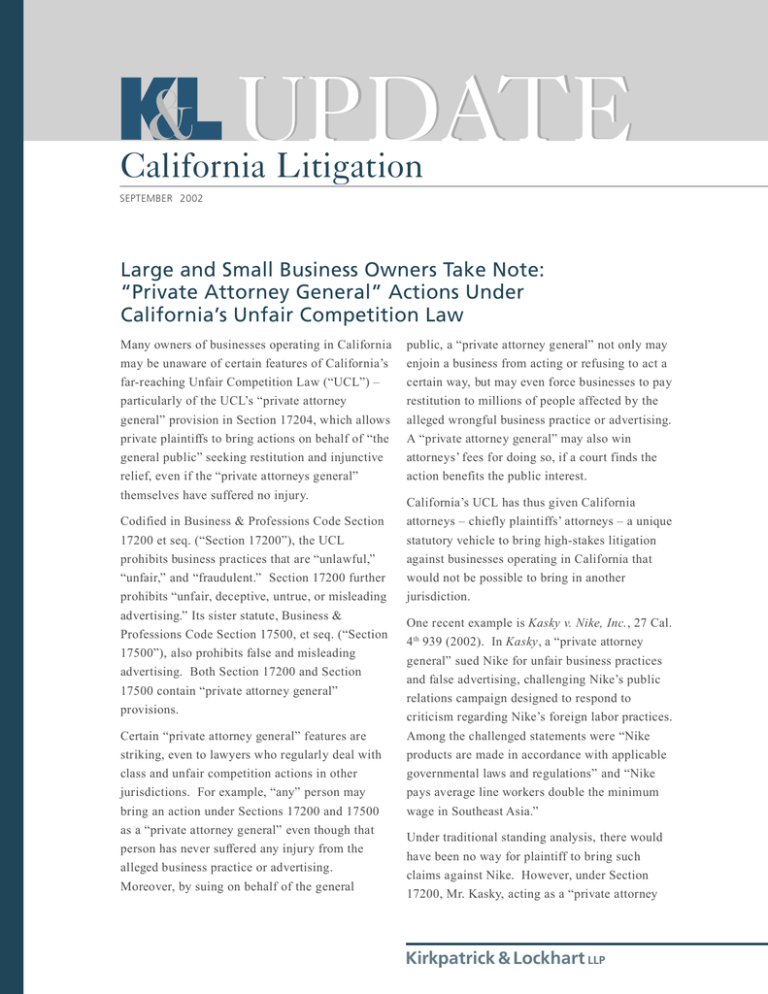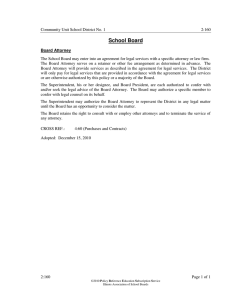
UPDATE
California Litigation
SEPTEMBER 2002
Large and Small Business Owners Take Note:
“Private Attorney General” Actions Under
California’s Unfair Competition Law
Many owners of businesses operating in California
may be unaware of certain features of California’s
far-reaching Unfair Competition Law (“UCL”) –
particularly of the UCL’s “private attorney
general” provision in Section 17204, which allows
private plaintiffs to bring actions on behalf of “the
general public” seeking restitution and injunctive
relief, even if the “private attorneys general”
themselves have suffered no injury.
Codified in Business & Professions Code Section
17200 et seq. (“Section 17200”), the UCL
prohibits business practices that are “unlawful,”
“unfair,” and “fraudulent.” Section 17200 further
prohibits “unfair, deceptive, untrue, or misleading
advertising.” Its sister statute, Business &
Professions Code Section 17500, et seq. (“Section
17500”), also prohibits false and misleading
advertising. Both Section 17200 and Section
17500 contain “private attorney general”
provisions.
Certain “private attorney general” features are
striking, even to lawyers who regularly deal with
class and unfair competition actions in other
jurisdictions. For example, “any” person may
bring an action under Sections 17200 and 17500
as a “private attorney general” even though that
person has never suffered any injury from the
alleged business practice or advertising.
Moreover, by suing on behalf of the general
public, a “private attorney general” not only may
enjoin a business from acting or refusing to act a
certain way, but may even force businesses to pay
restitution to millions of people affected by the
alleged wrongful business practice or advertising.
A “private attorney general” may also win
attorneys’ fees for doing so, if a court finds the
action benefits the public interest.
California’s UCL has thus given California
attorneys – chiefly plaintiffs’ attorneys – a unique
statutory vehicle to bring high-stakes litigation
against businesses operating in California that
would not be possible to bring in another
jurisdiction.
One recent example is Kasky v. Nike, Inc., 27 Cal.
4 th 939 (2002). In Kasky, a “private attorney
general” sued Nike for unfair business practices
and false advertising, challenging Nike’s public
relations campaign designed to respond to
criticism regarding Nike’s foreign labor practices.
Among the challenged statements were “Nike
products are made in accordance with applicable
governmental laws and regulations” and “Nike
pays average line workers double the minimum
wage in Southeast Asia.”
Under traditional standing analysis, there would
have been no way for plaintiff to bring such
claims against Nike. However, under Section
17200, Mr. Kasky, acting as a “private attorney
Kirkpatrick & Lockhart LLP
general,” may have the ability to force Nike to
disgorge all monies obtained as a result of Nike’s
alleged unfair practices, and to force Nike to
undergo a court-approved public information
campaign to correct any false or misleading
statements. The Supreme Court in its May 2002
opinion allowed the suit to proceed, despite Nike’s
claim that regulation under Section 17200
infringed Nike’s First Amendment rights.
Other examples of recent “private attorney
general” actions include:
■
■
A lawsuit filed against Bank One in which the
plaintiff alleged that Bank One’s “Same-AsCash” advertisements were false and
misleading because the advertisements did not
indicate that consumers were required to make
a minimum monthly payment and would be
liable for late payment fees. The Court of
Appeal allowed the plaintiff to proceed with the
lawsuit under Section 17200.
A lawsuit filed against AT&T in which the
Court of Appeal determined it to be misleading
for a long distance telephone company to sell
prepaid phone cards without disclosing that the
consumer’s calls would be rounded up to the
next whole minute.
The lack of a standing requirement in Section
17200 has enabled – and even encouraged – the
formation of corporations whose sole function is
to bring litigation under the statute. For example,
in Stop Youth Addiction, Inc. v. Lucky Stores, Inc.,
17 Cal. 4th 553 (1998), the plaintiff was a private,
for-profit corporation specifically formed to bring
a Section 17200 action against a defendant
accused of violating a penal statute prohibiting the
sale of cigarettes to minors. Other plaintiffs’ firms
have formed similar corporations that purport to
bring actions on behalf of consumers.
What makes matters worse from the defendants’
perspective is that Section 17200 actions are
difficult to defend against, because the wording
and reach of the statute is so broad. Plaintiffs may
2
allege that a business is engaged in “unlawful”
business practices merely by alleging that the
business is violating or has violated nearly any
state or federal regulation, regardless of whether
that state or federal regulation would otherwise
afford plaintiff a private right of action.
An action alleging “unfair” business practices is
even more difficult to defend against. An action is
“unfair” when its harm outweighs its utility, or
where a business practice offends an established
public policy or when the practice is immoral,
unethical, oppressive, unscrupulous, or
substantially injurious to consumers. This
“intentionally broad” standard is designed to
allow courts “maximum discretion to prohibit new
schemes to defraud.” Motors, Inc. v. Times Mirror
Co., 102 Cal. App. 3d 735 (1980). As a result of
this broad wording, it is difficult to get a Section
17200 action dismissed on the pleadings or on
summary judgment.
Finally, an action alleging “fraudulent” business
practices or “deceptive” or “false” advertising
need only demonstrate that the business practice
or advertising is “likely” to deceive the public.
There is no need to prove that any member of the
public was actually deceived, that any member of
the public reasonably relied on the business
practice or advertising, or that any member of the
public sustained injury as a proximate result of the
business practice or advertising. Thus, unlike
class actions based on common-law fraud, a
defendant cannot defeat a “private attorney
general” action based on fraudulent business
practices or advertising by showing that
individualized issues of reliance make the action
untenable. See Fletcher v. Security Pacific
National Bank, 23 Cal. 3d 442 (1979).
Defendants are at risk for “private attorney
general” actions brought by state residents to the
extent defendants are doing business in California.
To the extent out-of-state residents are harmed by
conduct occurring in California, they too may
seek the protections of Sections 17200 and 17500.
KIRKPATRICK & LOCKHART LLP CALIFORNIA LITIGATION UPDATE
See Wershba v. Apple Computer, Inc., 91 Cal. App.
4 th 224 (2001); Norwest Mortgage, Inc. v. Superior
Court, 72 Cal. App. 4 th 214 (1999); see also
Diamond Multimedia Systems, inc. v. Superior
Court, 19 Cal. 4 th 1036 (1999) (out-of-state
purchasers of securities entitled to bring suit under
California Corporations Code section prohibiting
market manipulation). Apparently, the only
defendants beyond the reach of Sections 17200
and 17500 are those engaging in activities wholly
outside California, and which harm only out-ofstate residents. See Norwest Mortgage, above.
Notwithstanding the broad reach or such actions,
there are significant limitations to “private
attorney general” actions under Sections 17200
and 17500. For example, a “private attorney
general” action under Sections 17200 and 17500
may recover only restitution and injunctive relief.
For now, the Supreme Court has read “restitution”
narrowly to mean either (1) the return of money
(or property) that was once in the possession of
the plaintiff and/or (2) “quantifiable sums one
person owes to another,” such as back wages.
Kraus v. Trinity Mgmt. Servs., Inc., 23 Cal. 4th 116
(2000); Cortez v. Purolator Air Filtration Prods.
Co., 23 Cal. 4 th 163 (2000).
This could change, however. The Court of
Appeal, in a class action under the UCL that did
not involve a “private attorney general,” recently
held that it would allow the recovery of disgorged
profits over and above the Kraus and Cortez
definition of restitution. Corbett v. Superior
Court, 2002 WL 1969843 (Aug., 27, 2002). This
holding will likely vastly increase the sums
defendants will be required to pay to settle or
satisfy judgment in UCL class actions going
forward. Moreover, the California Supreme Court
is currently poised to decide whether a “private
attorney general” in a non-class action can also
seek disgorgement of profits. Should the Supreme
Court decide that disgorgement is an allowable
SEPTEMBER 2002
remedy in non-class actions as well, it will
encourage “private attorneys general” to bring
more such claims. In the meantime, “private
attorneys general,” such as Mr. Kasky above,
continue to assert their entitlement to the
disgorgement remedy.
There are various defenses to “private attorney
general” actions, though, as noted above, “private
attorney general” actions are rarely dismissed on
the pleadings. For example, the California
Supreme Court has limited the sweeping scope of
Section 17200 by identifying a ‘safe harbor’
exception to the standard for “unfair” practices.
Cel-Tech v. Los Angeles Cellular Telephone, 20
Cal. 4 th 163 (1999). In Cel-Tech, the Court
articulated the view that plaintiffs could not use
Section 17200 to “plead around” a statute or
regulation that had expressly legalized the targeted
conduct.
While the Cel-Tech “safe harbor” is good news for
defendants who find a statute that expressly permits
the business practice or advertising, quite often
defendants face an uphill battle in defending a
“private attorney general” action brought under
Section 17200 and 17500. Should a business face
such an action, it should retain competent
California counsel who have experience with the
issues raised in the unique context of a “private
attorney general” action.
ROBER
T E. FEYDER
ROBERT
feyderre@kl.com
310.552.5023
JONA
THAN M. COHEN
JONATHAN
cohenjm@kl.com
415.249.1029
MA
TTHEW G. BALL
MATTHEW
ballm@kl.com
415.249.1014
DYLAN B. CARP
carpdb@kl.com
415.249.1019
Kirkpatrick & Lockhart LLP
If you would like to discuss any of these issues in greater detail, please
contact any one of the following K&L California Litigation Group lawyers:
Los Angeles
Robert Feyder
Michael Mallow
Tom Petrides
David Schack
Ron Stevens
Paul Sweeney
Fred Ufkes
310.552.5023
310.552.5038
310.552.5077
310.552.5061
310.552.5000
310.552.5055
310.552.5079
San Francisco Jon Cohen
Ed Sangster
Charles Thompson
Addresses
rfeyder@kl.com
mmallow@kl.com
tpetrides@kl.com
dschack@kl.com
rstevens@kl.com
psweeney@kl.com
fufkes@kl.com
415.249.1001 jcohen@kl.com
415.249.1028 esangster@kl.com
415.249.1017 cthompson@kl.com
10100 Santa Monica Boulevard, Seventh Floor
Los Angeles, California 90067
Four Embarcadero Center, 10th Floor
San Francisco, California 94111
®
Kirkpatrick & Lockhart LLP
Challenge us. ®
www.kl.com
BOSTON
■
DALLAS
■
HARRISBURG
■
LOS ANGELES
■
MIAMI
■
NEWARK
■
NEW YORK
■
PITTSBURGH
■
SAN FRANCISCO
■
WASHINGTON
.........................................................................................................................................................
This publication/newsletter is for informational purposes and does not contain or convey legal advice. The information herein
should not be used or relied upon in regard to any particular facts or circumstances without first consulting a lawyer.
© 2002 KIRKPATRICK & LOCKHART LLP.
ALL RIGHTS RESERVED.



